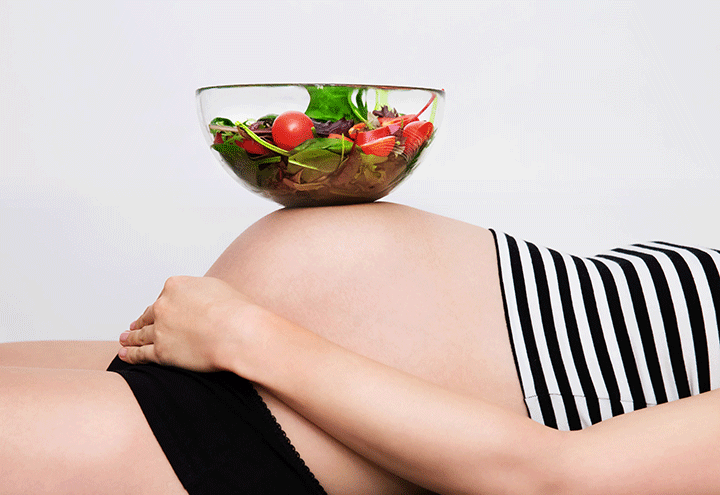
Optimal nutrition during pregnancy is essential; for not only yourself to cope with the increased demands of childbirth but also for the well-being of your baby.
Being a mother starts when your baby is growing inside of you. Your baby obtains all his nutrients from you and the saying ‘you are what you eat’ holds greater truth. As you embark on this exciting journey, here are some tips on food and nutrition during pregnancy.
Tips To Healthy Eating During Pregnancy:
Eat Nutritiously, Not Excessively
It is important to maintain your weight within the healthy weight range. Eating for 2 is a myth! Gaining excessive weight during pregnancy will increase the risk of developing diabetes and high blood pressure during pregnancy. In addition, obese mothers are more likely to require a caesarean section.
In the first trimester, NO extra calories are needed! The total calorie requirement is just 2000/day which is similar to a non-pregnant woman. Subsequent to that, only 300 extra calories per day are required (i.e. 2300 calories/day) during the 2nd and 3rd trimester.
It is essential to eat carbohydrates (starch containing foods), protein (meat), fruits and vegetables in appropriate amounts.
You should also use salt and sugars in small controlled amounts. Excessive salt can cause increased thirst and water retention while excessive sugars can increase the risk of obesity.
Space Out, Snack Smart
In the first trimester, mothers may experience morning sickness. As the pregnancy progresses, you might experience heartburn, gastric problems and bloatedness. Try taking smaller portions during main mealtimes with healthy snacks in between. This prevents your stomach from distending too quickly and ensures that your gastric juices always have something to work on.
Diet Essentials: Folate, Calcium, Iron & DHA
Folic Acid– 400 micrograms of folic acid daily in the first 12 weeks of fetal development has been shown to reduce malformations in the baby’s brain and spinal cord by 75%. This can be given as a supplement and is also found in citrus fruits, green leafy vegetables and lentils.
Iron is needed for the formation of red blood cells that is needed to carry oxygen in the blood stream. This can be found in green leafy vegetables, red meat like beef and mutton, cereals and nuts. Iron is also available as a supplement that can be prescribed by your doctor. Vitamin C, which is found in fresh fruits and vegetables, can aid in the absorption of iron.
Calcium is an essential mineral needed for building the baby’s bones and teeth. This is found in dairy products like milk and cheese, nuts, tofu and vegetables like spinach. It can also be supplemented in milk powders that are specially formulated to the growing needs required in expectant mothers e.g.: Similac Mum. This formulation has all the benefits of having the essential nutrients without the additional calories found in full cream milks.
DHA is an omega-3 fatty acid that is needed for baby’s brain and eye development. This is mainly found in fish and certain nuts and seeds like walnuts and flaxseeds.
Fibre Up
Constipation is very common in pregnancy. Increase your intake of high fibre fruits and vegetables to prevent this. These are also an excellent choice as a healthy snack as they fill you up, without the unwanted calories!
Stay Cool
Dehydration occurs more often in expectant mothers and especially in our hot and humid climate. 8-10 glasses of water is recommended to keep you fresh and hydrated throughout the day. This also helps with constipation.
Latest Articles
How Are Abdominal Hernias Treated?
What to Expect from Colorectal Surgery
How to Treat Breast Inflammatory Conditions
Gynaecomastia: Understanding Male Breast Cancer
Foods To Avoid In Pregnancy
Being responsible for a life growing inside of you makes you more aware of the nutritional demands that you need to provide. It is the start of being a mother. Taking care of your own nutritional needs during pregnancy is the best head start in life that you can give to your unborn child. No one can ask for more.
- Raw foods e.g. sashimi, raw oysters, undercooked meat or raw eggs. These sometimes contain the bacteria known as Salmonella, which can cause food poisoning and dehydration.
- Unpasteurized milk is found in soft cheeses like Blue, Brie and Camembert. These may contain the bacteria called Listeria, which can cause a severe infection in you and your baby, with a chance of stillbirths in 20% of affected babies when it happens during pregnancy.
- Excessive consumption of alcohol can cause growth restriction, prematurity and mental retardation in babies.
- Certain types of fish, e.g. shark, swordfish, and king mackerel, may contain higher levels of mercury that can be harmful to your baby. But you can safely eat up to 12 ounces of fish low in mercury (shrimp, salmon, catfish, canned tuna, etc.) per week while pregnant. These are an excellent source of protein and DHA. Most foods are safe in pregnancy so you can still enjoy the foods that you usually like as long as you know how to make healthy choices and eat in moderation.
Read this next ...
WHO WE ARE
关于SOG
新加坡O&G有限公司(SOG)成立于2011年,我们的愿景是创立一个专业的医疗和外科团队,从而满足现代女性及其孩子和家人的医疗保健需求。我们的诊所遍布新加坡各地,女性和儿童能够方便地享受我们高质量和值得信赖的个性化医疗保健服务。
- 产科
- 妇科
- 妇科肿瘤
- 乳房和普通外科
- 皮肤科
- 儿科
Recommended Obstetricians





